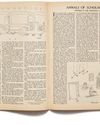
The first thing Stéphane Breitwieser steals from Belgium's Art & History Museum is an index card. Folded in half and set inside a partially empty display case, it reads, in French, "Objects Removed for Study." The museum contains one of the largest collections of art and antiquities in Europe, but Breitwieser immediately recognizes that, for his purposes, its most valuable item is the notecard. He jimmies open the case, pockets the card, and, together with his girlfriend and accomplice, Anne Catherine Kleinklaus, strolls onward. To anyone who happens to notice them, they look like a happy, art-loving young couple enjoying a date at a museum, which, in a sense, they are.
A few rooms later, another display case catches Breitwieser's eye. This one is filled with fantastically ornate sixteenth-century silver objects, including goblets, chalices, and a miniature warship. The lock, he notices, is high-end but poorly installed; he smacks the top and the cylinder drops out of its housing and into the display case. Breitwieser helps himself to two chalices and a tankard, then sets the index card down where they used to be. Only when he and Kleinklaus have reached his car does he realize that he has left the lid of the tankard behind. That won't do. He is an aesthetic perfectionist; a topless tankard will be a torment to him. Kleinklaus knows this about her boyfriend and, although he is usually the improvisational genius, she can hold her own when circumstances require it. She takes out one of her earrings and returns to the entrance, Breitwieser in tow. When she shows the guard her remaining earring and says she thinks she knows where she lost the other one, he lets them both back inside. At the display case, Breitwieser takes the tankard lid, along with-why not? two additional goblets.
هذه القصة مأخوذة من طبعة June 26, 2023 من The New Yorker.
ابدأ النسخة التجريبية المجانية من Magzter GOLD لمدة 7 أيام للوصول إلى آلاف القصص المتميزة المنسقة وأكثر من 9,000 مجلة وصحيفة.
بالفعل مشترك ? تسجيل الدخول
هذه القصة مأخوذة من طبعة June 26, 2023 من The New Yorker.
ابدأ النسخة التجريبية المجانية من Magzter GOLD لمدة 7 أيام للوصول إلى آلاف القصص المتميزة المنسقة وأكثر من 9,000 مجلة وصحيفة.
بالفعل مشترك? تسجيل الدخول

SUBJECT AND OBJECT
What happened when Lillian Ross profiled Ernest Hemingway.

ROYAL FLUSH
The fall of red.

Roz Chast on George Booth's Cartoons
There's almost nothing I like more than a laughing fit. It is a non-brain response, like an orgasm or a sneeze.

CHUKA
I have always longed to be known, truly known, by another human being. Sometimes we live for years with yearnings that we cannot name.

Rachel Aviv on Janet Malcolm's "Trouble in the Archives"
As Janet Malcolm worked on \"Trouble in the Archives,\" a two-part piece about prominent psychoanalysts who disagreed about Freud, she began a correspondence with Kurt Eissler, the head of the Sigmund Freud Archives.

PERSONAL HISTORY - A VISIT TO MADAM BEDI
I was estranged from my own mother, so a friend tried to lend me his.

AMERICAN CHRONICLES - WAR OF WORDS
Editors, writers, and the making of a magazine.

LIVE FROM NEW YORK
A new docuseries commemorates fifty years of \"Saturday Night Live.\"

TANGLED WEB
An arachnophobe pays homage to the spider.

TROUBLE IN PARADISE
Mike White's mischievous morality plays.